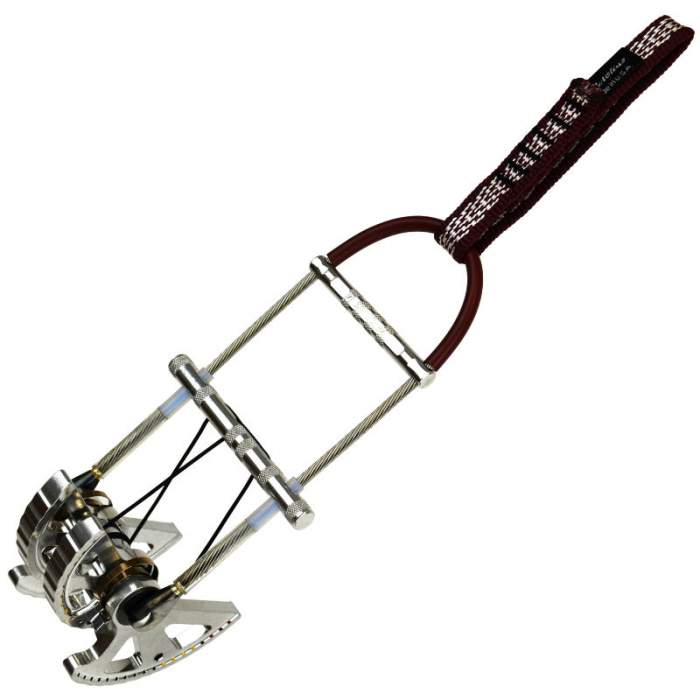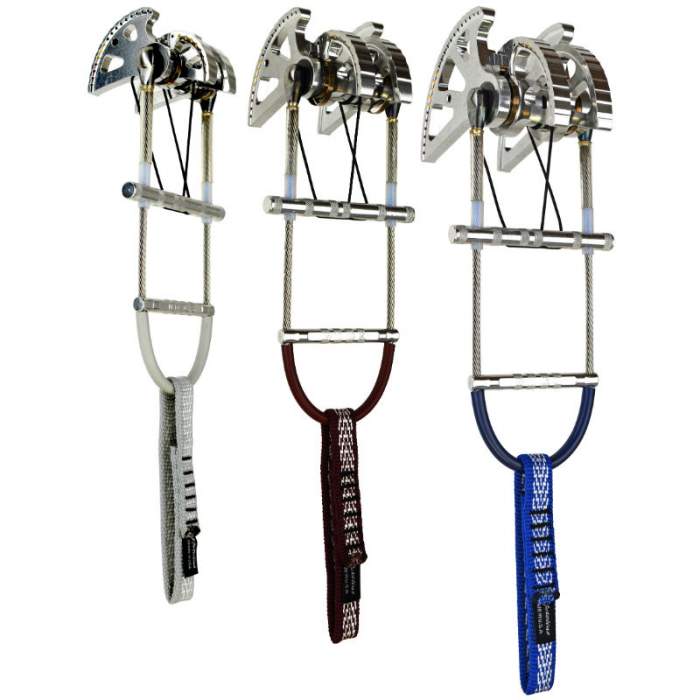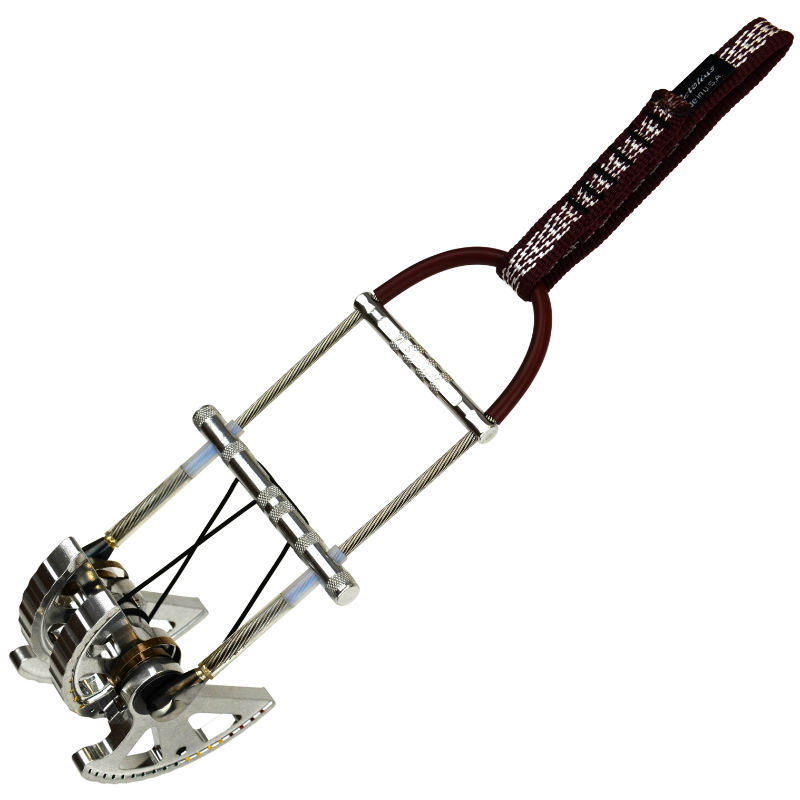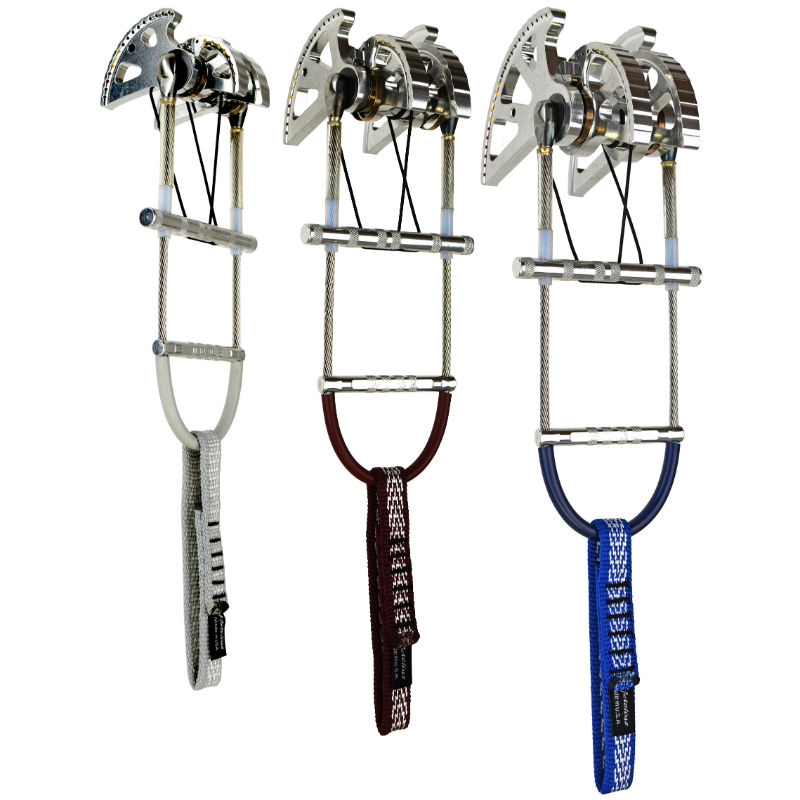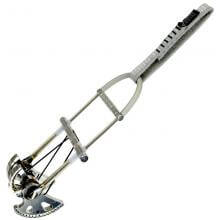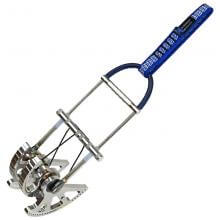How to use Metolius Cam, how cam works, lifespan, care and maintenance with instructional pictures.
Supercam Medium
Description
• A better design for medium and large cams(1½" and up)
• More stable than symmetric cams of the same size
• Asymmetric cam lobes give almost twice the range of conventional cams
• Kevlar trigger material is light, strong and field maintainable
• Radical new spring technology gives precise, equally-tensioned trigger pull throughout the entire range
• Range Finder tells you at a glance if you've chosen the right size cam for the placement
• Optimized cam angle for more outward force
• Wider cam faces for more grip
• U-shaped body for greater durability and unparalleled control during placement and retraction
• Machined cam stops
• ¾" (19 mm) tubular nylon webbing
• Color-coded sewn slings and tubing
• CNC machined for much greater precision than stamped or extruded cams
• 6061-T6 aluminum
• CE/UIAA certified
• Hand built, inspected and individually proof tested in Bend, Oregon
Retail price
When you click a link below and then checkout online, no matter what you buy (climbing gear or not), we get a small commission that helps us keep this site up-to-date. Thanks!

Weight (g / oz)  Weight (g / oz)In grams and ounces, the weight, as stated by the manufacturer/brand. | 255.0 g / 9.00 oz |
| Cam Head | 4 lobes, single axle |
| Offset | No offset |
| Stem | Flexible double stem |
| Sling | 11 cm x19 mm Nylon / Polyamide (single sling loop) |
| Camming Angle | 13.25° (angle is consistent throughout) |
| Active Strength | 12 kN |
Cam Range (mm / in)  Cam Range (mm / in)In millimeters and inches, the maximum dimensions of the cam lobes when shut tight and fully extended. Since the "usable" range is so debatable, all manufacturers now list the full dimensions to avoid selling themselves short. For offset cams, we'll list the max dimensions possible and then afterwards list each of lobe dimensions. | 52.5 - 91.5 mm (2.07 - 3.60 in) |
| Materials | Main Material: 6061-T6 aluminum |
| Certification | CE, UIAA |
No reviews yet.
Metolius Supercam proved to be a decent camming device. The innovative design gives these units the largest range of any we tested except for Omega Pacific Link Cams. Supercams also featured the widest cam lobes of any of the cams that we tested making them well suited for softer sandstone climbing. One aspect of the Supercams that we liked, but haven't found particularly useful in other Metolius cams is the Rangefinder. Because of the Supercams strange off center design, it's helpful to have the rangefinder on these as judging whether the cam is bomber or not is not as easy as with traditional style cams.
The Supercam sports a long axel and broad cam lobes. This is ideal for parallel placements, but can be a real thorn if you’re faced with awkward or finicky placement options. When you do find a good spot for the Supercam, the tight cam angle and large surface area of the lobes makes the cam really bite. Granted, all cams will hold falls when used correctly, but for what it’s worth, when it’s set right, the Supercam feels absolutely bomber.
The Supercam’s powers lie in its stability and strength, which, coupled with an incredible ability to get out of a tight squeeze, make it a noble addition to any trad rack. Place the Supercam in bomber rock, and you truly feel protected
This spring I have managed to get my hands on the new Metolius SuperCam. Its wide range, 1.55 inches to 2.77 inches, is twice that of most cams currently on the market. It also has wider cam faces, i.e. surface area, that give me more confidence on softer rock, as well as a range-finder feature with color-coding to congratulate me on my bomber placements. The new asymmetrical design looks so dramatic when the lobes are inverted that it is hard to imagine the cam is set properly. However, after numerous pitches and a few whippers, I can assure you this cam and its larger partners are destined to be an essential component of my rack.
We filmed Doug Phillips, the founder of Metolius, giving all the details of how and where to use the Supercam. He also talks about the unique construction, and the non-unique way to clean this cam. Note: This was my (Alison's) first editing job, so you might want to skip the first 16 seconds of intro.
Beth Rodden shows you how to inspect and maintain your cams.
The UIAA equipment standard provides a baseline for equipment performance in a test lab under controlled conditions on new equipment. Although these test conditions are relevant to the conditions encountered climbing, conditions encountered at the crags and the condition of the equipment are equally important. This recommendation from the UIAA member federation The British Mountaineering Council (BMC) provides vital equipment information that is NOT explicitly addressed in the standard, particularly failure modes of the equipment and recommendations for the use, inspection, maintenance, and retirement of equipment.
A pictoral representation of the UIAA-125 and EN-12276 standards for frictional anchors (which includes SLCD's [cams] and Ballnuts).

